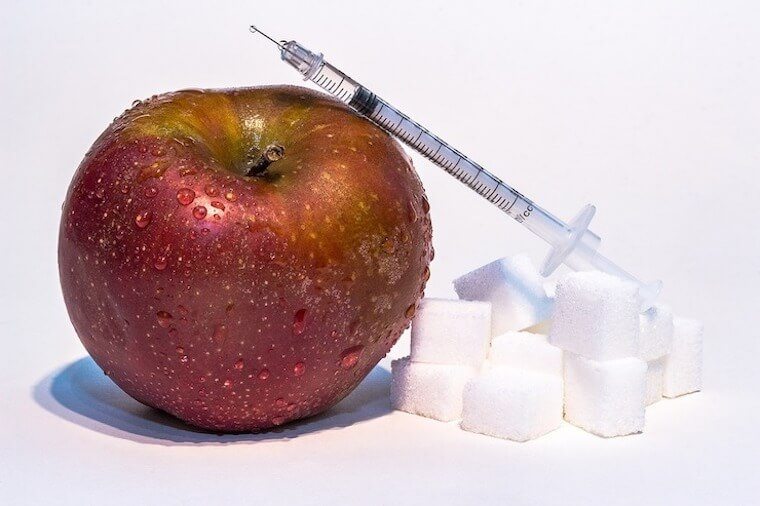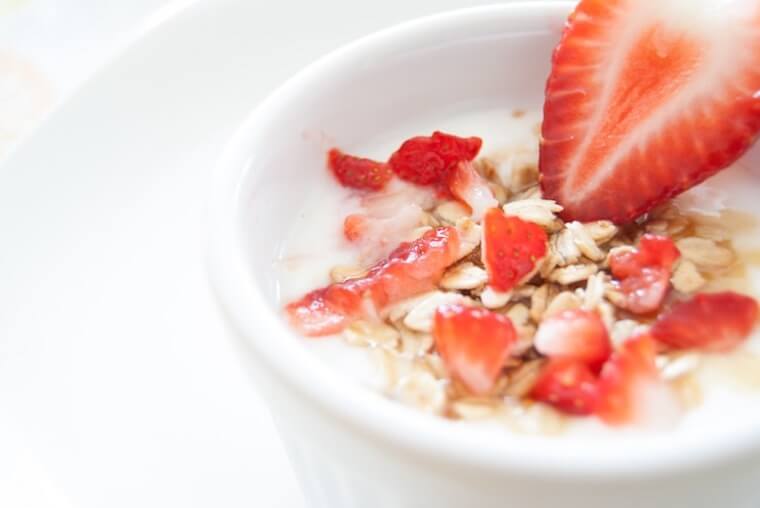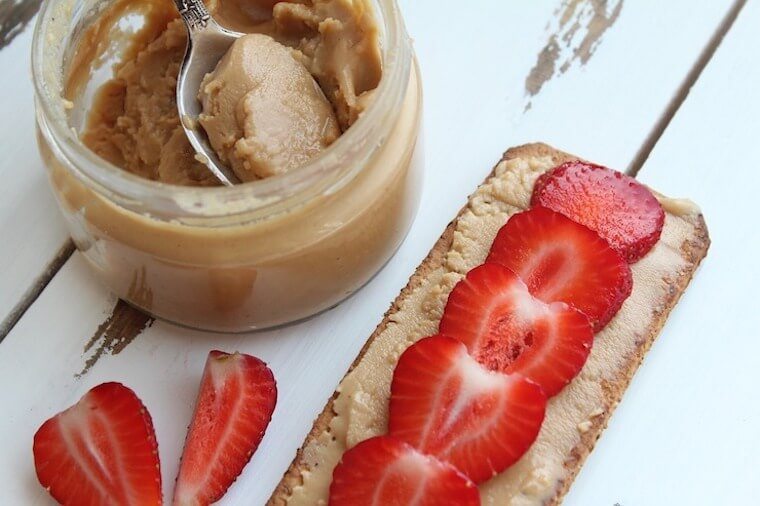I discuss the research on the diet for PCOS and what to eat if you want to better manage your polycystic ovary syndrome symptoms.

You may have never heard of PCOS, but for a large proportion of women, being diagnosed with PCOS is a major life changer and without proper management, can lead to the development of serious chronic illnesses. I should know, I’m now one of the 10% of women with the condition. While it may be one of the most common reproductive disorders, it’s also one of the most poorly understood from a dietary management perspective. Let’s look at what the research says about the diet for PCOS and what to eat to manage your symptoms.
So, What is PCOS?
Put very simply, Polycystic Ovary Syndrome or PCOS involves an imbalance in women’s sex hormones like estrogen, progesterone and testosterone (androgens) leading to the growth of ovarian cysts (benign masses). If left untreated, PCOS can lead to irregular periods or absent periods, fertility problems, unwanted hair growth on our face and body, acne, alopecia (hair loss from head), pregnancy complications and even cancer. Studies suggest that women who don’t ovulate (the condition known as an ovulation that’s associated with PCOS) are at three to four times greater risk of breast cancer than women who ovulate. Other research has also shown twice the risk of ovarian cancer in women with PCOS.
Because of the higher levels of androgens found in some women with PCOS, we often also see insulin resistance occur (aka. when your body loses its ability to use insulin to breakdown and transport glucose weakens over time). Insulin resistance is the precursor to type 2 diabetes and other chronic illnesses, so this is pretty serious stuff.

How is PCOS Diagnosed?
PCOS can be diagnosed when at least two out of the three of the following occurs:
- The ovaries are “polycystic” because either there are 12 or more follicles on one ovary or the size of one or both ovaries is high.
- Hyperandrogenism where there are high levels of androgens (male hormones) and/or symptoms of excess androgens like acne or excess hair growth.
- There is issues with your period like lack of periods, irregular periods, or lack of ovulation.
For me, I didn’t know I had PCOS until I came off the pill, gained a lot of weight immediately, and never got my period back. After a ton of blood work and ultrasounds, it was determined that I had symptoms 1 and 3 – too many follicles and no period or ovulation at all but my androgens were fine.
What About Treatment?
For the time being, there is no cure for PCOS, but there are several strategies recommended to manage symptoms and provide women living with PCOS the ability to live a long healthy life.
A multidisciplinary approach is necessary since the research suggests that women with PCOS are at risk for a variety of chronic diseases. A study by Marsh and colleagues discovered that the prevalence of type II diabetes is ten times higher among young women with PCOS than among non-PCOS women. It’s also estimated that an individual’s risk of heart issues is >7-fold higher in women with PCOS compared with non-PCOS women.
Medications for PCOS
Once diagnosed with PCOS, your doctor will likely prescribe you one or more medications. One of the most common medications prescribed is metformin. You may have heard of metformin in the treatment of type II diabetes, but it is also used to manage PCOS symptoms due to the intimate relationship between insulin and PCOS. The main role of metformin is to decrease glucose production in our liver, thereby lessening the burden of insulin. Research has shown that metformin improves insulin sensitivity, increases menstrual cyclicity and can decrease androgen levels in our body to reduce PCOS symptoms.
Aside from improving those parameters, there are a variety of medications aimed at improving fertility. Clomiphene citrate (CC) is a common medication used to treat infertility. The role of clomiphene is to interfere with our hormone pathways to increase the availability of FHS (follicle stimulating hormone) to promote ovulation. However, according to research, CC has been known to cause potential long term adverse effects. As an alternative to CC, research has now been looking at new ovulation-inducing agents like letrozole and anastrozole. These inhibit estrogen production in our brain which causes an increase in GnRH (gonadotropin-releasing hormone) and FSH which will optimize ovulation.

Finally, another common medication to prescribe is birth control. Birth control decreases androgen levels, but is obviously taken by women who do not wish to conceive (so it’s definitely not used for fertility). These meds are commonly used to reduce hair growth in unwanted areas and may improve skin acne. Sadly, there is limited evidence that birth control play a role at improving other metabolic parameters and may increase the risk of weight gain which can contribute to increased insulin resistance. I’ve written about that in great detail here so you can read all about weight gain and birth control here.
PCOS and Weight Loss
Research looking at PCOS has found that two-thirds of women with PCOS have a BMI > 25. This finding has led to fair bit of speculation that “obesity” may be a major risk factor in developing PCOS. Carrying excess fat is also considered by the medical community to be a risk factor for insulin resistance, which is another piece of the PCOS puzzle.

Since weight seems to consistently be sighted as a major player in PCOS, the primary form of treatment has always been to lose weight. Studies often claim that obesity and abdominal weight can worsen PCOS due to increased risk of insulin resistance, and that weight loss may help improve insulin sensitivity, menstrual regularity and quality of life.
Burt as a Dietitian, I get nervous (and critical) when I hear physicians prescribing general “weight loss” diet for pcos, and then just leaving the patient to undergo changes on their own. Is weight loss really the answer or are the behaviours (like healthy balanced eating and exercise) causing the observed improvements of symptoms? Are there consequences to these overarching recommendations?
Well yeah, there are. A recent 2017 study hypothesized that the prevalence of eating disorders or disordered eating is higher in women with PCOS than healthy women. The results are shocking. Across the board, women with PCOS are over four times more likely to report disordered eating behaviours than healthy women. This is because health practitioners tend to focus solely on weight loss or highly restrictive low carb diets for the management of PCOS which can overwhelm a patient and create a disordered relationship with food.
Great, another dilemma.

If you have a high number of women struggling with disordered eating as well as PCOS, doesn’t that conflict with treatment recommendations for weight loss? Imagine an eating disorder RD is trying to normalize an individual’s eating patterns by straying from a focus on weight, while a physician is telling individuals to focus on losing weight to manage PCOS symptoms. It may sound like a rarity, but it probably happens a lot more than you might think.
PCOS and a Low GI Diet
A lot of studies today are looking at different compositions of a diet for PCOS as a way to improve treatment. A 2013 systematic literature review looked at a variety of diet compositions such as low fat, high protein, high fibre, high carb, low carb and compared that with a variety of outcomes such as menstrual regularity, metabolic, psychological, insulin sensitivity and weight. In summary, there were no significant differences for the majority of the outcomes between the different diets that were assessed in the different studies. But there are some small differences to note.

One of the diet compositions that did have some merit and some potential benefits at managing PCOS symptoms was a low GI diet for PCOS.
I have spoken about glycemic index foods in the past, but for a quick refresher, a carbohydrate is rated from 0-100 in terms of its ability to raise your blood sugars. A low GI carb (<55) will cause slow digestion and absorption which causes a gradual rise in your blood sugar and thus, your insulin. Low GI foods are associated with maintaining normal blood sugars and are encouraged for their health benefits. Another drawback of having high levels of insulin in our blood is they make us crave carbs because insulin acts as an appetite stimulate.
One way to curb that is to focus on lower GI foods that keep us satiated and well nourished – this is true whether you have PCOS or not! Some low GI foods that are delicious and great to include in your diet for PCOS include berries, apples, spinach, beans, quinoa, milk, yoghurt, pasta, and steel cut oats. On the opposite end of the spectrum, a high GI carbs (>70) cause rapid digestion and absorption, as well as a quick rise in your blood sugar and insulin levels. These are foods like refined white bread, sugar and other sweets.

One study found that when individuals followed a low glycemic index (GI) diet for PCOS, their menstrual regularity was improved compared with individuals who followed a standard healthy diet. It’s important to note that the difference between both diets (low GI vs standard healthy diet) was solely the quality of the carbohydrates.
The mechanism behind its success seems to be that the lower GI foods improved insulin sensitivity which improved menstrual regularity. The other important piece is that the women who followed a low GI diet had greater improvements in emotions and quality of life compared to individuals following a standard healthy diet for PCOS.
Okay, let’s get this straight. Low GI foods doesn’t mean no carbs at all (or even necessarily low carb). Some people may be told that carbs are evil and to lose weight, the carbs have gotta go. That, my friends, has been disproven numerous times. When we cut out carbs, we tend to get into unhealthy binge eating habits which not only can lead to weight gain, but also can perpetuate PCOS symptoms because of the spike in insulin (more on that below).

Remember that all women experience PCOS symptoms differently, and there is insufficient evidence to say that a low GI diet for PCOS will work to manage your symptoms. Remember that the study also provided a reduced-energy diet for PCOS, so the reason some symptoms improved may have been because subjects lost weight, and not just because of the quality of carbohydrates.
Again, I’m troubled that this hasn’t been teased out a bit better.
All of the research seems to point at losing weight. However, what about the other one-third of women that are diagnosed with PCOS with a so-called “healthy weight” (like me!). Should I be trying to lose weight? Or what about women that are finding it practically impossible to lose weight and they start to turn to dangerous methods to lose weight and end up worsening their PCOS symptoms? There is a reason why women with PCOS are more likely to experience depression and negative body image and fall into disordered eating patterns.
And then there’s the other side of the coin. That purposefully losing weight may be making your PCOS worse.
Sorry to leave you on such a cliff hanger, but I do have some great suggestions on exactly what kind of diet for PCOS you need to consider in part 2 of this PCOS series. Click here to read part 2 of this PCOS series on the role of diet for PCOS and symptom management.
In collaboration with Sofia Tsalamlal, RD
Have you struggled with PCOS or infertility? What are your thoughts on losing weight for PCOS?
Leave me a comment below with your thoughts!
MORE BLOG POST YOU MIGHT LIKE
If you enjoyed this blog post discussing diet for PCOS, you might enjoy some more posts discussing women’s health:
- Period Talk: What to Do When You Lost Your Period
- Does Seed Cycling for Hormonal Balance Even Work?
- The Menstrual Cycle Diet | What to Eat on Your Period
- What to Eat to Help You Get Pregnant
- How Much Weight Do You Gain on Your Period?
- Can You Diet While Pregnant?

Abbey Sharp is a Registered Dietitian (RD), regulated by the Ontario College of Dietitians. She is a mom, YouTuber, Blogger, award winning cookbook author, media coach specializing in food and nutrition influencers, and a frequent contributor to national publications like Healthline and on national broadcast TV shows.




EA The Spicy RD says
So much great info here Abbey! I have had a few clients with PCOS, so it’s always good to read the latest info and research. Looking forward to part 2!
Abbey Sharp says
Thank you! Here’s part 2 if you haven’t checked it out yet: https://www.abbeyskitchen.com/pcos-diet-part-2/
Bridget @EatRightMama says
Abbey, thanks for unraveling the latest science on PCOS. I also recommend low GI foods as well as balance at meals and snacks for women with PCOS. Lower GI diet is also linked to improved fertility.
Abbey Sharp says
Cool, thanks for sharing 🙂
Amanda Leendertse @ Fueled Fork says
Such a great post Abbey! I’ve seen lots of (frustrated) clients over the years with PCOS who have been given the advice to “just lose weight.” I’ve also dealt with some post-pill issues myself. Love that you are shedding some light on the evidence surrounding this topic. Looking forward to part 2!
Abbey Sharp says
Yes! Thanks so much for sharing
Esther says
This! All of this!
I have struggle with many issues for years and every dr would tell me to lose weight and eat healthier (one dr even said weight loss surgery but I know that’s not what I need!) Nothing changed anything!
I finally found a dr who listened and she was shocked no one tested me for PCOS!! Literally getting tested this coming week for PCOS and many other things! This post was very helpful! I look forward to the next one!
Thank you!!!!!!
Abbey Sharp says
That’s great to hear. Check out part 2 of my PCOS series where I talk diet and PCOS management: https://www.abbeyskitchen.com/pcos-diet-part-2/
Carmy says
Eek, I’m a little scared to get off the pill now. I’ve heard so many stories of being diagnosed after going off the pill.
Abbey Sharp says
Yes, I know. But I do believe that being informed about these things puts you in a better position.
Emily | EmPowered Nutrition says
This was so informative, Abbey! I always am curious about PCOS & this really helped me learn a lot!
Abbey Sharp says
That’s great to hear. Thank you so much 🙂
Deborah @ Confessions of a mother runner says
I did not really know anything about this PCOS thanks for sharing all the info
Abbey Sharp says
You’re welcome!
Jessica @Nutritioulicious says
Love how approachable you make all this information. Great job Abbey!
Abbey Sharp says
Thank you so much 🙂
Vincci says
Amazing, well-researched post, Abbey! And thank you for sharing your experience. I’m just wondering when you say, “two-thirds of women with PCOS are considered “overweight” or “obese” in clinical terms” whether simply saying “have a BMI >25” would be more concise/sensitive?
Abbey Sharp says
yes youre right. I changed it! thanks Vincci!
dixya @food, pleasure, and health says
i know few people who are dealing with it and i will be sure to pass it along. great article as always 🙂
Abbey Sharp says
thank you!
Abigail Joy says
Wow, Abbey, this is so informative and so easy to read! I have already shared this post with a friend who is going through something very similar! Thank you for sharing and for being so honest and candid! YOU ARE AWESOME!!
~Abby
Abbey Sharp says
aw thank you Abby!!
Katie says
I am that friend that Abby sent this post to! Thank you so much for this information. I am like you one of those “leaner” PCOS individuals. I was diagnosed last year and while I live a paleo/ gluten free lifestyle I still do not have my cycle back after getting off birth control 2 years ago. It a daily learning for me, but I appreciate more people making this condition known!
Abbey Sharp says
Hey Katie, thanks for sharing your story! It’s important we keep talking about it
Mandy Enright says
Thanks so much for putting this article together. I have a ton of clients with PCOS who are trying so hard to lose weight. There’s a lot of conflicting info out there. Thanks for setting it straight!
Abbey Sharp says
my pleasure- part 2 is coming!
Abbey Sharp says
As promised, here is part 2 of my PCOS series where I talk diet and PCOS management: https://www.abbeyskitchen.com/pcos-diet-part-2/
Jessica says
I have struggled with PCOS from a very young age. As did my mom who passed from Ovarian Cancer. I found that a gluten free diet and some organic supplements drastically changed they way I felt and menstrated. I have also found that the only way I am able to loose weight is on a low carb diet. The low GI diet didn’t work as well for me.
I was able to have two children on a gluten free diet and now have a regular period with the help of a product called Juice Plus! I wish you lots of luck and success in treating your PCOS!
Abbey Sharp says
thank you- so glad you were able to find something that works.
acktive life says
Your posts are always so educational and insightful. Thank you for sharing all this information regarding this topic. I honestly knew nothing about it and it is important to know about these topics.
Abbey Sharp says
so glad you liked
Debbie Brown says
I have suffered from pcos since puberty. I started at age 12 with irregular periods but nothing showed in bloodwork. I hated going to the specialists who couldn’t figure out the issue. In my early 20’s the excess hair came in. Legs, arms, chin, neck, and face. Still they said hope no clue. I saw a dermatologist for acne as if suffered that postulate crap as teen into 20’s and she told me I needed to request internal ultrasound as she felt this was a symptom of pcos. Lo snd behold she was right snd i began Metformin under care of endocrinologist. However once I lost weight, he said all looked good and took me off everything and no need to see him. I went on about my life, took up running in June 2014 to keep weight off but in September it didn’t matter as my a1c was almost 9. So I’m back on metformin but a1c doesn’t go down much so we try jenuvia, etc and land on Victoza which is slowly bringing a1c down. It’s a frustrating right rope I walk because I’m still considered obese but it’s hard to lose weight.
Abbey Sharp says
i totally understand. yes, it is hard to lose weight so maybe focusing on the healthy behaviours is better.